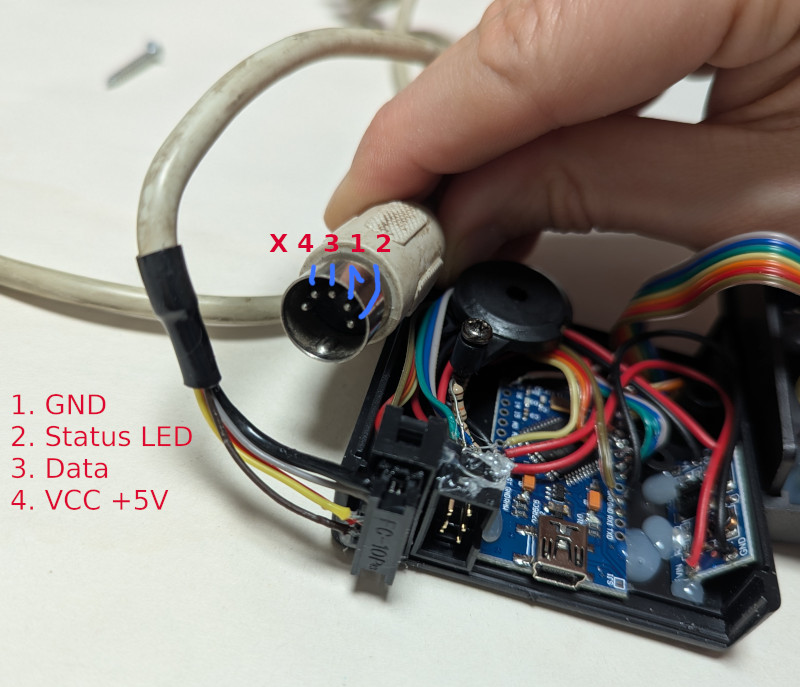| box.jpg | ||
| consul-vdx-term-keyboard-converter.ino | ||
| DIN5_pinout.jpg | ||
| overview.jpg | ||
| README.md | ||
Keyboard Converter: Consul 262.5 & VDX 52600
Arduino project for a keyboard converter between a Zbrojovka Consul 262.5 terminal keyboard and a Videoton VDX 52600 terminal.
Why? Because the VDX 52600 terminal doesn't use the AT or XT keyboard protocol. And neither does the Consul 262.5. This converter aims to translate between the two non-standard protocols, making these devices usable!
Keyboard: Consul 262.5
Terminal keyboard from 1980s built in Brno, Czechoslovakia.
It uses a DB25 connector with UART TTL data lines, clock line, +5V primary power and -12V auxiliary power. The -12V voltage alone makes in unusable with the current computer hardware, so a converter is necessary.
Terminal: VDX 52600
VT52 terminal from 1987 built in Hungaria. The serial interface is an RS-232 on a DB25 connector.
It features a DIN5 keyboard connector that does not use the standard AT/XT keyboard protocol.
Converter
Interfaces the keyboard and the terminal, optionally a USB. These modes of operation are supported:
- Keyboard and terminal connected: primary standalone mode. Everything is powered from the terminal.
- Keyboard and USB connected: USB keyboard mode. Powered from the USB which acts as a HID keyboard.
- Terminal and USB connected: Serial keyboard over USB mode. Powered independently. Allows sending keystrokes to the terminal over USB serial.
Parts needed
- Arduino Leonardo
- Symmetrical boost converter, 5V to +/- 12V
- Piezo speaker
- red and green LED + 470 ohm resistors
- connectors
- project box
- (among others)
Connections
Terminal DIN5
| Device | Controller | Description |
|---|---|---|
| GND | GND | Ground |
| +5V | +5V | Power |
| Data | 6 | Keyboard data to terminal |
| Status | 7 | Status (LEDs) and Clock from terminal |
Keyboard DB25
| Device | Controller | Description |
|---|---|---|
| GND | GND | Ground |
| +5V | +5V | Power |
| -12V | -12V | via a symmetrical boost converter |
| Serial out | 3 | UART out from keyboard |
| Serial in | 4 | UART in to keyboard |
Box Interface
| Controller | Description |
|---|---|
| 10 | Offline LED |
| 9 | Online LED |
| 8 | Speaker |
VDX 52600 keyboard protocol
Since I didn't have any compatible keyboard, I tried reverse-engineering the protocol. Following are my findings:
- on the Status pin, the terminal periodically sends out a status "packet" with the state of LEDs
- on the Data pin, the keyboard sends 8-bit key codes
- it seems to rely on a shared baud rate, expecting the keyboard to synchronize on the periodic status messages sent by the terminal
- the terminal is not listening for key codes while it is transmitting the status packet
Terminal's DB25 connector
The VDX 52600 terminal uses the standard RS-232 serial link through a DB25 connector. It is enough to connect pins (2) TX, (3) RX and (7) GND. See RS-232 over DB25 connector for more.
Beware that this is an RS-232, so the voltages are not safe for a standard USB-to-serial module. Use an RS232-to-TTL converter such as the MAX232 chip.
By default the serial port configuration is 9600–8-N-1 (i.e. the standard baud rate of 9600). Connecting it to a serial port of a Linux machine works nicely and you get a vintage console experience.


